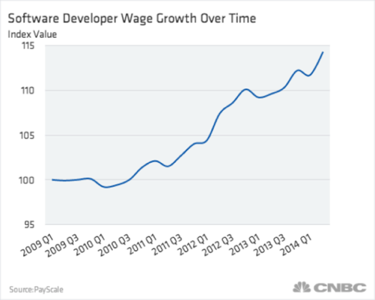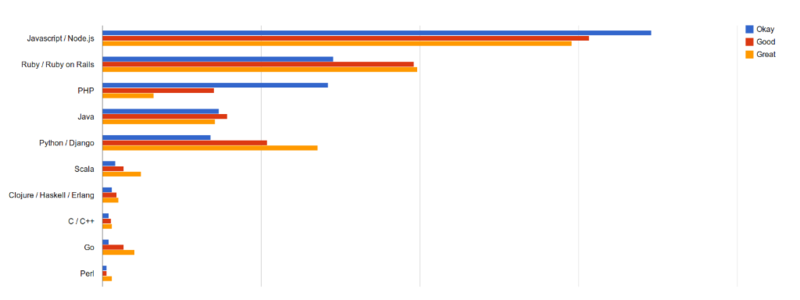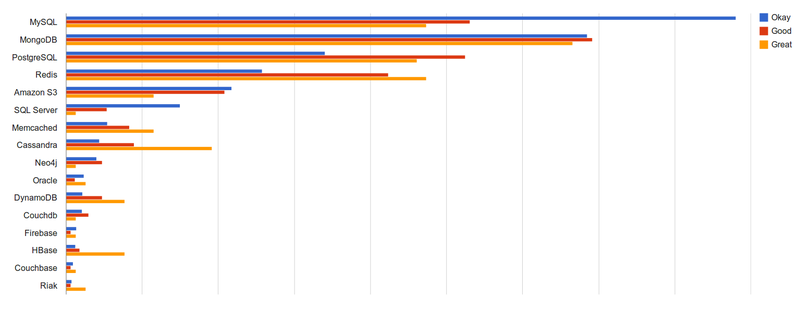Ever wonder why your Silicon Valley developer peers make more money than you? As Brookings analyst Jonathan Rothwell points out, it’s not because they’re more experienced than you. Rather, it’s because the technology skills they do have are “particularly valuable.”
What are these skills, you ask?
While it’s impossible to get an exact read, Leo Polovets’ analysis of AngelList data offers some strong clues as to the skills you need to build a winning startup (and a few, like PHP, that you’d do better to avoid).
See also: PHP, Once The Web’s Favorite Language, Is On The Wane
The Valley’s Money Machine
Developers everywhere are a well-paid lot. As U.S. Bureau of Labor Statistics data shows, there are over 643,000 application developers in the U.S., with salaries ranging from $42,250 to $183,380, across 66 industries. Developers in the Information and Manufacturing industries carry particularly big wallets.
The closer a developer is to a coast, the better her chances of clearing $100,000, as Brookings analysis shows:

As much as developers make, generally, however, they make most—and by a considerable margin—in San Jose, Calif.
Why?
Well, there’s the obvious element of supply and demand that keeps driving developer salaries ever higher. Developers tend to get paid more in the Valley because, well, employers have little choice. (Actually, they do, as I’ve written, but too few take the choice of remote, open source-style development.)

Even so, Rothwell says that something more may be driving Silicon Valley developer wages: they tend to possess higher-value tech skills. As he writes:
For example, 8.4 percent of ads for software developers in San Jose requested Java, a widely used programming language, associated with an average salary of $98,000 across all U.S. ads mentioning both it and a salary requirement. Yet, for the United States as a whole, just 5.7 percent of software developer ads required Java. In New York City, the share was 6.7, and it was 4.7 in Louisville.
Despite having less experience than developer peers in other high-cost, competitive metropolitan areas, Silicon Valley developers make more because they know more about the tech that matters most.
So which tech is this, exactly?
What The Popular Kids Use
Using AngelList data, Leo Polovets peeks under the hood of successful startups and compares the technology they use to those of lesser startups. It’s an imperfect measure—it’s not 100% clear that the AngelList “Signal” score Polovets relies on truly measures company quality and popularity, although it seems to do so reasonably well. Still, it’s at least a running start at figuring out what successful startups—and the developers that power them—use to build their applications.
In the following charts—and apologies in advance; they’re also small and hard-to-read in the original—the different colors represent how “successful” the startups in question are, as measured by that “signal” score.
Sometimes, as in the case of programming languages, the best and worst developers use the same technology:

But sometimes there’s a clear delineation between what the most successful startups use and what the least successful companies adopt.
For programming languages, for example, Polovets notes that “[t]he likelihood that PHP is being used is strongly anti-correlated with company quality.” Similarly, “[t]he better the company, the more likely it is to be using modern and/or functional programming languages (i.e. Go, Scala, Haskell, Erlang, Clojure).”
Or take the database, storage and caching layer:

There aren’t any real surprises in terms of what the top startups use (MySQL with a big lead). But Polovets’ conclusion that “[t]he better the company, the less likely it is to build on top of Microsoft’s products (SQL Server)” might be a wake-up call to Microsoft developers. So might his suggestion that company quality strongly correlates with iOS development and that “[t]he better the company, the more likely it is to use IaaS (e.g. AWS) instead of PaaS.”
Strong developers, in other words, seem to want to have more direct control over the technologies they use, rather than offloading the heavy lifting to a platform.
Growing Out Of Neverland?
While Polovets’ data suggests across the board that “The better the company, the less likely it is to build on top of Microsoft’s products,” it’s clearly not a good reflection of which technologies are currently most important to big companies. Microsoft remains the top “mega-vendor” with CIOs and looks unlikely to lose that place anytime soon.
But the data does help to remind us why Silicon Valley’s software developers get paid so much: they know the best new technology, which technology may well turn out to be the fuddy-duddy technology of the future. (Java, for example, remains highly relevant today, but used to be the language of upstarts.)
Is it enough to know these hot technologies? Probably not. If you’re living in Des Moines, Iowa, you’re probably not going to get a Silicon Valley salary no matter how much Haskell you know.
Then again, you won’t have to deal with traffic along Highway 101, either, so consider yourself even.
Lead image by Cory Doctorow










